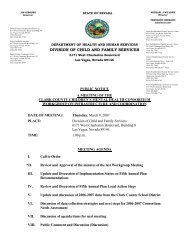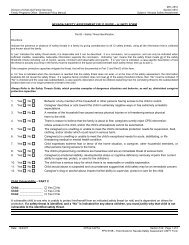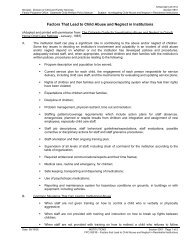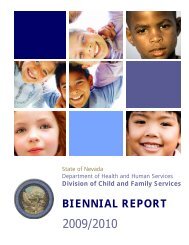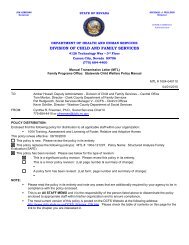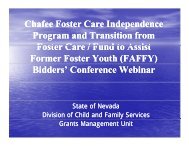STATE OF NEVADA - Division of Child and Family Services
STATE OF NEVADA - Division of Child and Family Services
STATE OF NEVADA - Division of Child and Family Services
Create successful ePaper yourself
Turn your PDF publications into a flip-book with our unique Google optimized e-Paper software.
Emergency shelter for a child.<br />
The prevention, identification, <strong>and</strong> correction <strong>of</strong> abuse or neglect <strong>of</strong> a child in<br />
residential institutions.<br />
Evaluating the development <strong>and</strong> contents <strong>of</strong> plans submitted for approval under NRS<br />
432B.395, which pertains to efforts to prevent or eliminate the need for removal <strong>of</strong><br />
children from their homes, <strong>and</strong> to facilitate a safe return to homes where removal is<br />
necessary.<br />
Substitute care is a family-focused service that provides for the temporary care <strong>of</strong> children in<br />
need <strong>of</strong> protection. Its services are aimed at changing behaviors in parents that have resulted in<br />
child maltreatment leading to out-<strong>of</strong>-home placement. The <strong>Division</strong> returns children who have<br />
been removed <strong>and</strong> may be safely restored to their families through the provision <strong>of</strong> services to<br />
the child <strong>and</strong> family. When reunification is not possible, the <strong>Division</strong> seeks alternative<br />
permanency options which best suit the child’s needs. Specifically, the <strong>Division</strong> provides<br />
assessment <strong>and</strong> comprehensive case management services that support the child, the parents, <strong>and</strong><br />
the caregivers.<br />
The continuum <strong>of</strong> out-<strong>of</strong>-home care services includes emergency shelter care, foster family care<br />
(including placements with relatives), group home care, therapeutic foster care, respite care,<br />
residential treatment care both in <strong>and</strong> out <strong>of</strong> state, <strong>and</strong> independent living services. The <strong>Division</strong><br />
emphasizes the safety <strong>and</strong> wellbeing <strong>of</strong> children, recognizes the family as the fundamental<br />
foundation <strong>of</strong> child rearing, <strong>and</strong> acknowledges the importance <strong>of</strong> a comprehensive, communitybased,<br />
child-centered, family-focused, <strong>and</strong> culturally competent teamwork approach.<br />
The <strong>Division</strong> believes families <strong>of</strong>fer children <strong>and</strong> young adults opportunities for permanency <strong>and</strong><br />
family relationships that are intended to last a lifetime. Permanency affords the stability <strong>and</strong><br />
security that children must have for building competency <strong>and</strong> self-reliance <strong>and</strong> for maximizing<br />
their cultural <strong>and</strong> spiritual growth. The <strong>Division</strong> supports collaborative efforts in every<br />
community to help assure permanence in the lives <strong>of</strong> all children.<br />
DCFS began major child welfare reform in 1992 with the commitment to move from a protective<br />
authority to a family-centered approach in casework. The first phase was the adoption <strong>of</strong> a<br />
training series for social workers that incorporates the philosophy <strong>and</strong> principles <strong>of</strong> familycentered<br />
practice in the four major casework areas:<br />
1. <strong>Child</strong> protective services (CPS)<br />
2. Adoption<br />
3. Foster care<br />
4. <strong>Child</strong> welfare<br />
In 1994, the second phase <strong>of</strong> this initiative included the creation <strong>of</strong> the Foster Care Statewide<br />
Steering Committee to address pr<strong>of</strong>essionalization, training, <strong>and</strong> retention <strong>of</strong> foster caregivers.<br />
The goal was to improve the quality <strong>of</strong> foster care by means <strong>of</strong> a family-centered approach with<br />
foster caregivers. The yearlong efforts <strong>of</strong> this task force <strong>and</strong> its three subcommittees resulted in<br />
a number <strong>of</strong> improvements within foster care. These included the following:<br />
CRP ANNUAL REPORT 2009 26



